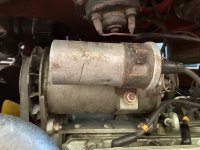Smells electrical to me; a fuel delivery problem would likely get worse as RPMs increase. I had a rotor fail--killed engine dead, suddenly--at Mesa Verde, CO in the middle of a long road trip. Diagnosed rotor failure--easy enough--and replaced with one of the 4 or 5 I had in the boot (bad rotors were a known issue at the time). I didn't spend much time examining the bad one, but don't recall any obvious 'tracks' or other damage. Problem was generally attributed to the rivets on the arm.
Same with a bad distributor cap, Bosch brand IIRC, that would cause the car to stumble on acceleration when hot, but worked OK cold at steady RPMs. Finally diagnosed using the 'dark test:' run car in a dark garage, with adequate ventilation, natch, and look for stray electrical pulses. Mine clearly showed a bright streak down the side of the cap, again with no visible marks on the cap. Replaced with genuine Lucas which has been reliable.
Coils fail, but not often. Mine is the original AFAIK, with 210K miles, and is beat all to h*** but works fine. They can develop an internal short in the dielectric, but it would perform badly at all speeds.

 Hi Guest!
Hi Guest!

 smilie in place of the real @
smilie in place of the real @
 Pretty Please - add it to our Events forum(s) and add to the calendar! >>
Pretty Please - add it to our Events forum(s) and add to the calendar! >> 

